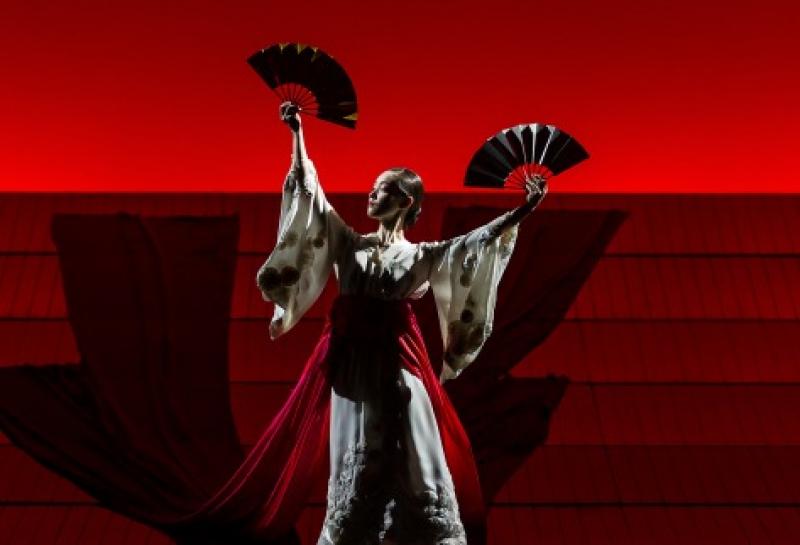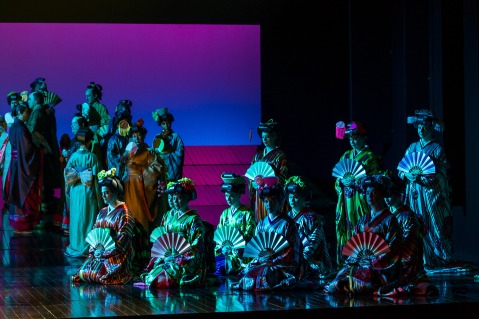Madam Butterfly, English National Opera | reviews, news & interviews
Madam Butterfly, English National Opera
Madam Butterfly, English National Opera
Minghella's classic production makes a stylish return to ENO

Origami birds flock in graceful chorus, a dancer flutters two fans into a pulsing captive butterfly, curtains of cherry blossom descend over glowing paper lanterns, and of course a small bunraku puppet steals the show. Seven years on Anthony Minghella’s Madam Butterfly is as beautiful as ever, and – if possible – even more Japanese.
This Olivier Award-winning production is up there with Jonathan Miller’s Mafia Rigoletto as one of English National Opera’s all-time stars, and for its visual aplomb and emotive excess deserves every bit as long a career. Revived here by Sarah Tipple, the show has the odd clumsy moment (which will doubtless improve through the run) but benefits from the return of two of the opera’s original cast – Mary Plazas as the tragic Butterfly, and Gwyn Hughes Jones as Pinkerton.
There’s something in the gauzy loveliness of it all that still sticks in the throat
After Bryan Hymel’s strained performance in the 2009 revival, Hughes Jones makes a welcome appearance to reclaim his role. His is not the largest of voices (and certainly a minnow compared to the heft on offer up the road at the Royal Opera House) but there are colours there beautiful enough to rival even Michael Levine’s sets, and Hughes Jones deploys them well. Never over-singing but romping up to Pinkerton’s insistently high climaxes with absolute commitment, Hughes Jones’s only weakness comes in the ensembles where his lack of brute power can unbalance things slightly. His legato however (showcased best in a glowing “Dovunque al mondo”) offers generous compensation.
 Few operatic suspensions of disbelief are greater than those demanded by the vocal challenges of Puccini’s 15- (and latterly 18-) year-old heroine. Mary Plazas (pictured right with Hughes Jones as Pinkerton) like many before her offers a maturity that flourishes best in Act II, but which fails to give the role the joyous innocence Puccini surely writes into the chattering interruptions and love-talk of his score. Plazas’s Butterfly is tragic from her first uttering, and while it’s an impressively controlled dramatic performance (and her characterful husk in lower registers and the resonance of her floated pianissimos do their work well) it still lacks arc.
Few operatic suspensions of disbelief are greater than those demanded by the vocal challenges of Puccini’s 15- (and latterly 18-) year-old heroine. Mary Plazas (pictured right with Hughes Jones as Pinkerton) like many before her offers a maturity that flourishes best in Act II, but which fails to give the role the joyous innocence Puccini surely writes into the chattering interruptions and love-talk of his score. Plazas’s Butterfly is tragic from her first uttering, and while it’s an impressively controlled dramatic performance (and her characterful husk in lower registers and the resonance of her floated pianissimos do their work well) it still lacks arc.
Pamela Helen Stephens is quietly establishing herself as an unexpected star at ENO, and her Suzuki marks another major step forward. Stephens proved in last year’s The Return of Ulysses that she can do dramatic intensity, and here it was harnessed to some seriously weighty singing, tempered for the Flower Duet into glowing warmth, but later released at its full force. Less successful was John Fanning’s Sharpless who made the Consul even more of a cipher than usual, and failed to bring much by way of sheen to his singing. Oleg Caetani’s rather indulgent speeds didn’t help, but others coped with these rather better. Less indulgence could also be wished of the brass section, whose triumphant moments risked obliterating the tender fragility of Minghella's staging, not to mention most of the singing.
 David Parry’s libretto doesn’t improve with acquaintance, and all Minghella’s vernacular imagery goes for naught when trapped in such sung banalities as “a multi-purpose dwelling”, while Sharpless’s “Goddam that Bastard Pinkerton” is still funny rather than stirring. Escaping textual hindrances, Sorrow’s many black-clad puppeteers still bring unnatural life and pathos to their wooden charge, and it would take a stern viewer indeed not to be a little bit susceptible to this expressive creature.
David Parry’s libretto doesn’t improve with acquaintance, and all Minghella’s vernacular imagery goes for naught when trapped in such sung banalities as “a multi-purpose dwelling”, while Sharpless’s “Goddam that Bastard Pinkerton” is still funny rather than stirring. Escaping textual hindrances, Sorrow’s many black-clad puppeteers still bring unnatural life and pathos to their wooden charge, and it would take a stern viewer indeed not to be a little bit susceptible to this expressive creature.
It’s hard to believe, looking at the assured manipulation of stage space and planes of action that this was Minghella’s first opera production. As a visual spectacle it is beyond reproach, but there’s something in the gauzy loveliness of it all that still sticks in the throat.
Concealing the ugliness of the tale behind sliding screens, transforming blood into flowing scarves, a real bastard child into a puppet, Minghella risks a dangerous complicity with Puccini. Both score and set conspire to shroud Butterfly in romance, to elevate a grubby intrigue into a grand passion. The result is faithful and beautiful, but lacks the piquant clarity of productions that read against the grain and strip this Orientalist epic back to the warped skeleton concealed behind cherry blossom, or under the many silken folds of a kimono.
Buy
Share this article
The future of Arts Journalism
You can stop theartsdesk.com closing!
We urgently need financing to survive. Our fundraising drive has thus far raised £49,000 but we need to reach £100,000 or we will be forced to close. Please contribute here: https://gofund.me/c3f6033d
And if you can forward this information to anyone who might assist, we’d be grateful.

Subscribe to theartsdesk.com
Thank you for continuing to read our work on theartsdesk.com. For unlimited access to every article in its entirety, including our archive of more than 15,000 pieces, we're asking for £5 per month or £40 per year. We feel it's a very good deal, and hope you do too.
To take a subscription now simply click here.
And if you're looking for that extra gift for a friend or family member, why not treat them to a theartsdesk.com gift subscription?
more Opera
 Ariodante, Opéra Garnier, Paris review - a blast of Baroque beauty
A near-perfect night at the opera
Ariodante, Opéra Garnier, Paris review - a blast of Baroque beauty
A near-perfect night at the opera
 Cinderella/La Cenerentola, English National Opera review - the truth behind the tinsel
Appealing performances cut through hyperactive stagecraft
Cinderella/La Cenerentola, English National Opera review - the truth behind the tinsel
Appealing performances cut through hyperactive stagecraft
 Tosca, Royal Opera review - Ailyn Pérez steps in as the most vivid of divas
Jakub Hrůša’s multicoloured Puccini last night found a soprano to match
Tosca, Royal Opera review - Ailyn Pérez steps in as the most vivid of divas
Jakub Hrůša’s multicoloured Puccini last night found a soprano to match
 Tosca, Welsh National Opera review - a great company reduced to brilliance
The old warhorse made special by the basics
Tosca, Welsh National Opera review - a great company reduced to brilliance
The old warhorse made special by the basics
 BBC Proms: The Marriage of Figaro, Glyndebourne Festival review - merriment and menace
Strong Proms transfer for a robust and affecting show
BBC Proms: The Marriage of Figaro, Glyndebourne Festival review - merriment and menace
Strong Proms transfer for a robust and affecting show
 BBC Proms: Suor Angelica, LSO, Pappano review - earthly passion, heavenly grief
A Sister to remember blesses Puccini's convent tragedy
BBC Proms: Suor Angelica, LSO, Pappano review - earthly passion, heavenly grief
A Sister to remember blesses Puccini's convent tragedy
 Orpheus and Eurydice, Opera Queensland/SCO, Edinburgh International Festival 2025 review - dazzling, but distracting
Eye-popping acrobatics don’t always assist in Gluck’s quest for operatic truth
Orpheus and Eurydice, Opera Queensland/SCO, Edinburgh International Festival 2025 review - dazzling, but distracting
Eye-popping acrobatics don’t always assist in Gluck’s quest for operatic truth
 MARS, Irish National Opera review - silly space oddity with fun stretches
Cast, orchestra and production give Jennifer Walshe’s bold collage their all
MARS, Irish National Opera review - silly space oddity with fun stretches
Cast, orchestra and production give Jennifer Walshe’s bold collage their all
 Káťa Kabanová, Glyndebourne review - emotional concentration in a salle modulable
Janáček superbly done through or in spite of the symbolism
Káťa Kabanová, Glyndebourne review - emotional concentration in a salle modulable
Janáček superbly done through or in spite of the symbolism
 Buxton International Festival 2025 review - a lavish offering of smaller-scale work
Allison Cook stands out in a fascinating integrated double bill of Bernstein and Poulenc
Buxton International Festival 2025 review - a lavish offering of smaller-scale work
Allison Cook stands out in a fascinating integrated double bill of Bernstein and Poulenc
 Tosca, Clonter Opera review - beauty and integrity in miniature
Happy surprises and a convincing interpretation of Puccini for today
Tosca, Clonter Opera review - beauty and integrity in miniature
Happy surprises and a convincing interpretation of Puccini for today
 Hamlet, Buxton International Festival review - how to re-imagine re-imagined Shakespeare
Music comes first in very 19th century, very Romantic, very French operatic creation
Hamlet, Buxton International Festival review - how to re-imagine re-imagined Shakespeare
Music comes first in very 19th century, very Romantic, very French operatic creation

Add comment